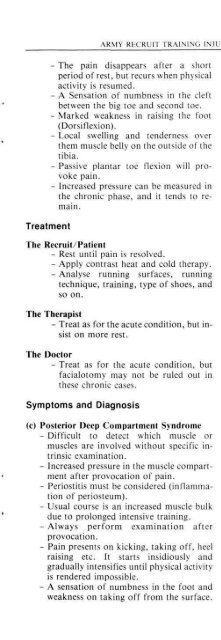ISSUE 75 : Mar/Apr - 1989 - Australian Defence Force Journal
ISSUE 75 : Mar/Apr - 1989 - Australian Defence Force Journal
ISSUE 75 : Mar/Apr - 1989 - Australian Defence Force Journal
- No tags were found...
You also want an ePaper? Increase the reach of your titles
YUMPU automatically turns print PDFs into web optimized ePapers that Google loves.
50 DEFENCE FORCE JOURNAL No. <strong>75</strong> <strong>Mar</strong>ch/<strong>Apr</strong>il 89Minister, Mr Hughes, until, early in the followingmonth, when Mr Hughes went to France totake part in the long drawn out preparations forthe Peace Conference which took place at Versaillesin June 1919. In France Mr Hughescould give Monash in London little if anyassistance. The <strong>Australian</strong> Government decidedthat Monash's work in London needed to bepresided over by a Senior <strong>Australian</strong> Ministerand so, on 20 December 1918, the Acting PrimeMinister, Mr W.A. Watt, informed the Houseof Representatives that Senator Pearce hadconsented to go to London for this purpose. 24This announcement of Senator Pearce's missionto London in 1919 released a torrent ofpublic abuse in Australia against SenatorPearce. Much of it originated in R.S.L. subbranchesand it reflected on the whole an appallingignorance, on the part of the critics, ofthe functions of the Stateman and the Soldier inmatters of policy and its execution. Pearce saidhimself that: "It was urged that ... Sir JohnMonash could quite adequately do the job.What these critics did not realise was that I, as aMinister, could and did go direct to Britishministers to obtain ships and facilities for thedemobilisation of our soldiers. Sir JohnMonash could not do this but could only makehis representations to officers like himself." Onthe 16 January 1919 The Argus published thefull text of a long letter from Senator Pearce tothe Victorian Branch of the R.S.L. in which hepointed out that:The Army of which you have been part is admittedto have been the best equipped, thebest paid, and the best fed of all the armiestaking part. Your leadership has been good.All these factors have been the foundationupon which your success has rested. Withoutthem your success would not have been asgreat as it has. These things did not merelyhappen, or come by chance, but were thedirect and unquestionable result of administration.How has that equipment for instancebeen provided? Let me remind youthat before this war —from 1910 to 1913 I,as Minister for <strong>Defence</strong>, was by my administrationpreparing Australia for war.During these years by strenuous work . . . Ibuilt up equipment in Australia of a moderntype spending no less than over £.600,000 tothis end, with the result that when the timecame for our first divisions to enter the fieldwe had arms and equipment with which tosend them forth — the direct result of the expenditurereferred to.Pearce sailed from Melbourne on 25 January1919 and he arrived in London on 19 <strong>Mar</strong>ch1919. This was his first visit to England sincehis attendance at the Imperial Conference inLondon in 1911. His six months in London onthis occasion was spent in work of great benefitto Australia; it was also work which dealt withwider aspects of the war than repatriation anddemobilisation. He said that: "Among the mattersI had to deal with whilst in London wasthat of the financial adjustment with the BritishGovernment of charges for expenditure in andarising out of the war. :5 The <strong>Australian</strong> Governmenthad undertaken to finance all its war efforts,and the disentangling and dissection ofaccounts was a gigantic task." He was assistedin this work by the <strong>Australian</strong> High Commissionerin London, Mr Andrew Fisher, and hisstaff.The financial relations which had developedbetween the British and <strong>Australian</strong> Governmentsin connection with war and post-war expenditure,and particularly that connected withthe repatriation and demobilisation of theA.I.F., covered a wide range and involved largesums of money. On matters of financial adjustmentwith the War Office in London, SenatorPearce said:The A ustralian Government provided or paidfor the equipment of the A.I.F., with the exceptionof the Air <strong>Force</strong>, heavy artillery andmotor transport. A t the end of the war practicallyall the equipment on charge to theA.I.F. was partly worn and the War Officeagreed to give the <strong>Australian</strong> Governmentnew equipment, in exchange for the partwornequipment, for five infantry divisionsand two light horse divisions. They also madeus a free gift of 100 aeroplanes.^In due course the work in Europe, whichSenator Pearce and the <strong>Australian</strong> PrimeMinister had gone there to do, was finished. MrW.M. Hughes, whose work on this occasionhad reached its zenith in the previous month atthe signing of the Treaty of Versailles betweenthe Allies and Germany in the Palace of Versailleson Saturday 28 June 1919, was the firstto go, accompanied by the <strong>Australian</strong> Ministerfor the Navy, Sir Joseph Cook. They left Londonby train on Tuesday 8 July 1919 forPlymouth. En route Mr Hughes addressed<strong>Australian</strong> troops staging at Sutton Veny,

















